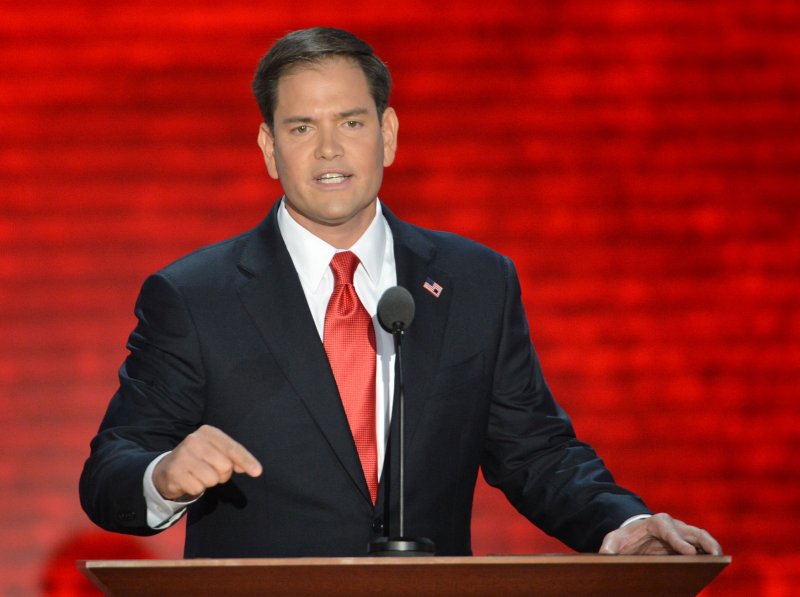1 of 2 | Sen. Marco Rubio, R-Fla., is seen as an up-and-comer in a Republican party that needs to retool before 2016. Aug. 30 file photo. UPI/Kevin Dietsch |
License Photo
More than a month has passed since Mitt Romney's defeat in the 2012 presidential election, but the finger-pointing continues as the Republican Party lurches toward the new year.
Unlike 2008, when John McCain of Arizona returned to the Senate and became the face and voice of the party after losing to President Obama, Mitt Romney has no other public office to use as a pulpit. He simply returns to private life -- although he recently was named to return to the Marriott International board of directors -- much criticized by those in his party as a flawed candidate who ran a flawed campaign.
While some blame the better organized Obama election machine and others lay criticism of the GOP standard-bearer, others have said the party's image -- particularly among Hispanics and women, who voted overwhelmingly for Obama -- is what needs retooling.
"Many Republicans are upset with the Romney campaign's approach to the 2012 election, believing that a winnable election was lost by a poor fall campaign," political commentator Steven Schier of Carleton College in Minnesota said. "The 2012 GOP presidential failure has prompted much reassessment within the party's ranks about how to avoid 2012's presidential mistakes in the future."
"You win and lose as a team," Republican Virginia Gov. Bob McDonnell, a potential 2016 presidential candidate, said in an interview with MSNBC. "We have to look at everything we do -- from logistics to turnout to technology to message to tone."
Now the party has to reinvent itself, an unpleasant but necessary task, top GOP strategists and lawmakers agree, and do so without an obvious leader to carry the party's message.
When McCain lost, he did so with his reputation basically intact and still speaks with authority on policy issues. Romney, even though he was the consensus presidential front-runner during the crowded Republican primary, had to overcome a distrustful base that never really warmed to him and now has been in relative seclusion, save a private lunch at the White House with Obama.
The GOP has come off as sputtering and still as shell-shocked as they were Nov. 7.
"A party that loses a presidential election always goes through a period of reassessment and seeming disarray," Schier said. "The 2012 GOP is no exception to this pattern. The party is rethinking its approach to elections and governing as it addresses issues like the fiscal cliff."
Even as the party reflects on how it governs, the Tea Party will remain a key factor in the GOP base, he said.
"They are the Republicans more likely to turnout in caucuses and primaries, to vote and to serve as campaign volunteers," Schier explained. "Tea Party preferences will loom large in the electoral and governing decisions of the GOP."
So, who can pick up the mantle of leadership?
The party has several up-and-coming prospects, including vice presidential candidate Paul Ryan of Wisconsin, who heads the House Budget Committee, and U.S. Sen. Marco Rubio, who was a headliner at the GOP convention in Tampa, Fla.
Both men -- considered potential presidential candidates in 2016 -- recently proffered their vision for the party's future that is more inclusive and more sensitive than it was perceived during the election.
Ryan, who spoke at the Jack Kemp Foundation Leadership Award Dinner in Washington last week, argued the Republican Party must go beyond "representing the aspirations of our nation's risk-takers."
"When our neighbors are struggling, we look out for one another," Ryan said. "We do that best through our families and communities -- and our party must stand for making them stronger."
We have a compassionate vision based on ideas that work," he said, "but sometimes we don't do a good job of laying out that vision. We need to do better."
Rubio, who received his Leadership Award at the dinner hosted by the charitable organization named for the late New York congressman and Housing and Urban Development secretary, took a soft shot at Romney's "47 percent" comment but didn't specifically mention it.
"Some say that our problem is that the American people have changed. That too many people want things from government," he said. "But I am still convinced that the overwhelming majority of our people just want what my parents had -- a chance."
"A new generation of national leaders is on the horizon for the GOP," commentator Schier said. "This group will be younger and more racially and ethically diverse. At the forefront of this group is ... Rubio, a Latino, Louisiana Gov. Bobby Jindal, of south Asian origin, and ... Ryan."
"More diverse leadership is essential for the party to be electorally competitive in a more diverse country," he said.
Among some of potential party leaders listed by The Washington Post are Gov. Chris Christie of New Jersey and former Gov. Jeb Bush of Florida.
Christie, who also gave a keynote address during the GOP convention, already announced he will seek re-election in 2013. Known for his blunt talk, Christie raised hackles when he praised the Obama administration's hurricane response a week before the election.
If Bush, son and brother of presidents 41 and 43, chooses to make his own move on the White House, the Post said he'll be making noise soon. Bush is well regarded within the party and has been advocating moderation on immigration for some time.
"Jeb Bush could play a significant role in helping the party get the tone and policy right," Republican National Committeeman Henry Barbour told the Post.















